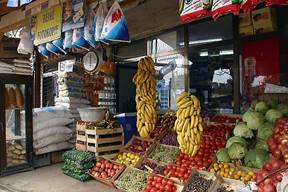Pumpkins, outliers and the Doing Business illusion
  |
|
- A closer look at Doing Business
- This year's surprise
- Inspiring others: Belarus, Kosovo, Russia
- An obvious confusion
Dear friends of ESI,
It is that time of the year again: pumpkins, trick-or-treat, costumes and the annual World Bank Doing Business report.
Launched twelve years ago, the World Bank report has been a phenomenal public relations success throughout the world. This autumn has been no different – from the United Kingdom to Myanmar, from India to Costa Rica, from the small islands of St. Kitts and Nevis to the larger island of Sri Lanka … media reported and policy makers responded. The Economist titled their piece on this year's issue "Where not to invest in Europe." It is difficult for any survey or report to catch the world's attention as well as the "Doing Business" project does.
People love competitions and the media love rankings, whether it is the richest people on the planet (Forbes) or the sexiest man alive (People Magazine). Lists and rankings make it easy to communicate information. They are useful for policy makers who want to push for reforms. However, they are dangerous when the results are misleading and when gaming the ranking becomes more important than focusing on what really matters for genuine reforms.
The Doing Business reports also have everything to make them irresistible for the media. From the very beginning, Doing Business reports have been written without jargon. There is a clear focus: the real economy, not abstract principles; real enterprises and entrepreneurs. Reports are about the problems of firms across the world, and their life cycle from birth (registration) to death (bankruptcy). They are about the kind of people the very first Doing Business report (published in 2003) described: Teuku from Jakarta, an entrepreneur who wanted to open a textile factory – but it took half a year to register this business. Ina from Panama, a business owner who had problems hiring people due to stringent labor regulation. Ali, a trader in the United Arab Emirates, who could not enforce his contracts due to the lengthy 500 day period for the settlement of late payment. Timnit from Ethiopia, who wanted to expand her consulting business but could not take out a loan. Avik from India, who wanted to get out of an unprofitable business but faced a 10 year-long bankruptcy procedure.
Doing Business also had a clear message for policy makers from the start. Too many entrepreneurs around the world suffer from cumbersome and unsound business regulations. Why does it take only "two procedures, two days, and less than 1 percent of annual income per capita to register a private limited-liability company in Australia," but "19 procedures in Belarus, Chad, and Colombia?" Why does one have to pay $5,531 in Angola to set up a new business, but only $28 in New Zealand?
Finally, and crucially, this is not a ranking that merely states the obvious. There are surprises. Unexpected success stories reinforce the World Bank's message that if any country follows concrete prescriptions it will achieve amazing results. It is "The Genius in all of us" and "Talent is Overrated" rolled into one for ambitious policy makers. It is the promise of fairy tales: the ugly duckling turns into a beautiful white swan, giving hope to all ugly ducklings in this world.
For a decade the paragon country of this World Bank "flagship project" has been such a huge surprise: Georgia, the wunderkind of Doing Business. Georgia overtook Germany in 2007, and remained ahead of Germany year after year in Doing Business rankings.
|
Year |
Georgia Ranking |
Germany Ranking |
|
2005 |
100 |
19 |
|
2006 |
37 |
21 |
|
2007 |
18 |
20 |
|
2008 |
15 |
25 |
|
2009 |
11 |
25 |
|
2010 |
12 |
22 |
|
2011 |
16 |
19 |
|
2012 |
9 |
20 |
|
2013 |
8 |
21 |
|
2014 |
15 |
14 |
Since 2007, the World Bank argued that Georgia was exemplary of what is possible when a government follows a formula seriously: any country can have the very best business climate in the world, even the second poorest country in Europe; any group of reformers can catch up to the very best within a short period of time. On 6 October 2009 the Georgian president told foreign diplomats in the Georgian parliament:
"The esteemed ambassadors are often giving us recommendations on how to manage the economy. We are ready to send to some of them our experts so as to enable them to at least slightly move forward, if they can't catch up with us. For example I would send experts to Holland with great pleasure."
A look at the top ten in 2012 explains this, otherwise puzzling, sense of confidence:
|
Rank |
2011 GDP based on PPP/capita (USD) |
|
59,710.286 |
|
49,416.992 |
|
28,011.542 |
|
48,327.861 |
|
37,047.872 |
|
53,396.308 |
|
36,521.590 |
|
31,220.484 |
|
5,491.003 |
|
40,847.132 |
Source for GDP: IMF, World Economic Outlook Database, October 2012.
Among these ten countries, Georgia was by far the most rural economy, with a large part of its work force in subsistence agriculture. It had the lowest share of exports as part of GDP. In 2012, its top export was used cars (EIU 2012), sold to its oil-rich neighbor Azerbaijan. And yet, its "business climate" was top. In 2013, one year later, Georgia was already 8th in the world, far ahead of Germany at 21st.
The Georgian success story of catching up with the most advanced economies in the world also inspired other countries. Other amazing success stories followed, corroborating the claim that in this competition, everybody could be a winner, even small Balkan nations. By 2012 Macedonia had moved up to the 23rd position in Doing Business, ahead of "twenty European Union members and all countries in central and eastern Europe," as its prime minister told business audiences around the world. In 2013, Macedonia was still 25th in the world and Switzerland 29th.
A closer look at Doing Business
"Georgia vs. Germany: Germany, a byword for economic prosperity, does all it can to encourage entrepreneurs… No, the real surprise is that in the latest tables the nation of Georgia ranks even higher. Oh, and the summers are warmer in Georgia too."
And the Winner is Georgia advertising campaign (2007)
ESI has conducted extensive research on the economies of both Georgia and Macedonia. The World Bank rankings – and the importance given Doing Business reports by elites in both countries – intrigued us. We wrote about Georgia and Doing Business. In January 2013, one of Germany's leading papers, FAZ, wrote a long article about our analysis on Georgia. And we set out to take a closer look at Macedonia. We focused on these two amazing results: how it was possible for Georgia to have a better business climate than Germany – not only for one year, but in consecutive reports, year after year – and how Macedonia managed to beat Switzerland.
This is what explains counterintuitive results: Doing Business rankings are made up of 10 distinct indicators. For each indicator, all countries are ranked. The overall ranking is the average of a country's performance on all 10 indicators. In the two tables below you see how easy it is to game the ranking system. Georgia and Macedonia had exceptionally high scores on a few indicators only (both countries for obtaining credit and for starting a business; Georgia also on registering property and Macedonia on protecting investors).
The table below shows the figures for 2013:
2013 Georgia vs Germany table
|
Doing Business Rank |
Georgia |
Germany |
|
Registering Property |
1 |
81 |
|
Getting Credit |
3 |
28 |
|
Starting a business |
8 |
111 |
|
Protecting Investors |
16 |
98 |
|
Paying Taxes |
29 |
89 |
|
Resolving Insolvency |
88 |
13 |
|
Dealing with Construction Permits |
2 |
12 |
|
Getting Electricity |
54 |
3 |
|
Trading Across Borders |
43 |
14 |
|
Enforcing Contract |
33 |
5 |
|
Overall global Ranking |
8 |
21 |
2013 Macedonia vs Switzerland
|
Doing Business Rank |
Macedonia |
Switzerland |
|
Getting Credit |
3 |
28 |
|
Starting a business |
7 |
104 |
|
Protecting Investors |
16 |
170 |
|
Paying Taxes |
26 |
16 |
|
Resolving Insolvency |
52 |
47 |
|
Dealing with Construction Permits |
63 |
58 |
|
Getting Electricity |
76 |
8 |
|
Registering Property |
84 |
16 |
|
Trading Across Borders |
89 |
35 |
|
Enforcing Contract |
95 |
20 |
|
Overall global Ranking |
25 |
29 |
In July 2014, ESI wrote about Macedonia and Doing Business in our report Vladimir and Estragon in Skopje. There, a sceptical Macedonian Estragon explains:
"Do you know how easily these rankings can be manipulated? Here is how it is done. There are ten indicators the World Bank uses. Switzerland beats us, not surprisingly, on seven out of ten: dealing with construction permits; getting electricity; registering property; paying taxes; trading across borders; resolving insolvency and enforcing contracts.
On the other hand, Macedonia is exceptionally good in three fields only. The first is starting a business, which in theory takes a few days here and a few weeks in Switzerland. I ask you: how much difference does this really make if it takes 16 days to set up a business, if after that things work well? Anyway, this is one way for Macedonia to beat the Swiss. The second is 'getting credit'. Totally implausibly it is supposedly easier to get credit in Skopje than in Zurich. I wonder how this sounds to our medium-sized companies that struggle to get loans. Finally, my favourite: 'protecting investors,' an assessment based on an obscure hypothetical scenario which does not apply to 99 percent of Macedonian businesses, but where for some reason Switzerland is 170th in the world.
Now add it all up, and, voila, you have the great illusion served by the World Bank: Macedonia 25th in the world, Switzerland 29th. Is this what the combined intellectual might of the World Bank has produced in order to help us understand our situation? I hear that Kosovo and Putin's Russia also want to focus on the Doing Business ranking now to improve their image. Perhaps they should hire a Macedonian consultant?"
Having studied these rankings, we were left with more questions than answers.
This year's surprise
Then this year, another surprise occurred, raising more questions. In its latest Doing Business report, published last week, the rankings for the previous year (2013) of all four countries we had looked at and written about were retro-actively corrected.
We learned that Georgia should have been 14th instead of 8th in 2013, finding itself – for the first time since 2007 – just behind Germany (13th instead of 21st). Furthermore, Macedonia should have been in 31st place and not 25th, with Switzerland moving up to 22nd from 29th. On one indicator alone, Switzerland moved from place 170 to place 123.
How can the business climate in a country change so much in in such a short time? Is it possible that critical newspaper articles (or ESI reports) have an influence on the changes in countries' rankings?
The report explains that "data points may be revised as new information is available, which is also applied to the time series to ensure consistency of data." And yet these corrections are curious. Will there be more dramatic corrections next year? Could it be that in reality, following further revisions, some of the most surprising success stories will turn out to be illusions?
Inspiring others: Belarus, Kosovo, Russia
 |
 |
|
|
The next outliers? Putin and Thaci |
||
No system of ranking is perfect. Quantifying and ranking something as complicated as disparate economies in varying political contexts is bound to raise questions. This year's Doing Business report notes in the introduction that any report can be misunderstood:
"…responsibility rests as much with the users of the ease of doing business ranking as with its producers to make sure that it is a valuable instrument of policy. Controversy has often arisen from reading more into the ranking or indicator than what it actually captures."
Is it fair to assert that the media and policy makers have "read too much" into the Doing Business rankings?
In fact, most of the hyperbolic rhetoric about the importance of Doing Business rankings has come from the World Bank itself. The promotion of surprising success stories has been central to claims that this is a different kind of survey, and that if poorer countries take these figures seriously, they are likely to escape poverty within a few years.
The very first Doing Business report set out to tackle the world's largest economic problem: global poverty, a situation where, as the report notes, in 2003 the number of people earning less than a dollar a day stood at 1.2 billion:
"In Africa, poverty rates have increased in the last three decades, with more than 40 percent of the population now living on less than one dollar a day. Two decades of macroeconomic reform in Latin America have not slowed the rise in poverty. And in most former Soviet countries, poverty increased in the decade prior to the fall of communism, and even faster thereafter."
In 2006, the creator of Doing Business, Bulgarian economist Simeon Djankov, commented on the amazing success of Georgia as offering evidence of this potential:
"I believe that after 10 years you will invite me to Georgia not for a presentation of Georgia as the number one reformer worldwide but for a presentation of Georgia as the country with the number one economy."
The message was clear: emulate Georgia, rise in the Doing Business rankings, and poverty may become a thing of the past within a decade.
Other countries emulated Georgia, and received praise for it. In 2012, the World Bank presented its top ten countries where the business climate had improved most since 2003: Georgia, Rwanda, Belarus, Burkina Faso, Macedonia, Egypt, Mali, Colombia, Tajikistan and Kyrgyz Republic. In fact, one thing that has helped the global popularity of Doing Business is that almost everyone can be a winner in one category or another. In 2012, World Bank experts found that there was no member state of the European Union where it was as easy to start a business or to register property as it was in Belarus. Or that an investor was better protected in Belarus (82nd) than in Germany (100th).
And so, in spring 2011, the Kosovo government announced its plans to lift "Kosovo to among the top forty reformers according to the World Bank's Doing Business Report by 2014." It also promised to eliminate 50 percent of license and permit requirements. The following year, Vladimir Putin "ordered [his own] government to improve Russia's "Doing Business" ranking with the World Bank from 120th in 2011 to 50th by 2015, and 20th in 2018."
Both Kosovo and Russia have since had reason to celebrate, joining the ranks of the many winners. Last year Kosovars were excited to note that their country – although still only 86th in the world – had "moved up ten places" and "ranked better than Serbia (93th), Albania (90th) and Croatia (89th)." In the most recent Doing Business report Kosovo moved up again to 75th Place. Not as fast as Putin's Russia, however. As Russia Today announced triumphantly, a Russia under sanctions and at war with its neighbour, had managed to "jump 30 places." Whatever else is happening in Eurasia, at least the Russian business climate keeps improving.
An obvious confusion
 |
 |
|
|
Business climates – Balkania vs. Danubia |
||
There is an obvious conceptual problem with the way countries are ranked in the Doing Business project. It has been present from the very outset. To better understand this central problem, imagine two very different economies from two hypothetical countries seeking to climb their way up in the World Bank's rankings.
The first country – let us call it Balkania – consists mainly of cafés, small shops, wedding parlours and subsistence farmers. The other – Danubia – is an industrial economy that produces high-value goods for export, with chemical plants, agro-processing, pharmaceuticals and industrial agriculture.
Doing Business only measures the regulations that apply both to an economy of very small businesses and subsistence agriculture, as well as to an industrial or advanced service economy. The analysis excludes any regulations specific to either simple or highly advanced economies.
Now assume that it takes fewer days to register a small shop in Balkania than in Danubia – it is certainly a good thing if this can be done in two days rather than in 20. It may well be true that Balkania has improved aspects of the regulatory system of its relatively primitive economy, particularly in the few areas that Doing Business measures. This would benefit many of Balkania's small entrepreneurs. And this is a good thing in itself, like in the real-world examples of Georgia and Macedonia, which have indeed improved aspects of their business climates since 2003.
But will such reforms attract investors who have avoided the small shops and cafes of Balkania, and have flocked to industrialised Danubia? Investors that create high-value added goods integrated into global chains of production, products which have helped Danubia catch up with its wealthy neighbours, while Balkania continues to fall behind?
Back to Macedonia, Switzerland, Georgia and Germany. To suggest that the quality of Macedonian business regulation is comparable along ten indicators with that of Switzerland is problematic from the outset. To suggest that the number of days it takes to register a shop or café is one of only ten decisive indicators for a country's business environment is misleading.
The analysis does not take into account many factors that are obviously crucial in an investor's decision to invest, among them: security; market size; macroeconomic stability; state of the financial system; and level of training and skills of the labour force. And within the indicators that are measured, certain critical aspects are left out, such as: the reliability of utilities; the cost and availability of credit for firms; and subsidies.
Overselling Doing Business can do harm, if it suggests that the key problems facing a country like Macedonia are easy to identify and to address without any real understanding of local comparative advantages or disadvantages, of existing businesses and industrial legacies. Doing Business authors argued that their research "defies the often used saying, 'one size doesn't fit all.'" This implies that it is straightforward both to diagnose the illness and to prescribe the right medicine.
It remains true today, as it was in 2004, that Georgia and Macedonia have much more to learn from Germany and Switzerland (or Poland and Slovakia, countries in "Danubia") than vice versa.
We started by noting that rankings are both useful and inescapable. This means that their authors have a responsibility to present the findings in such reports in a sober way. Here the Doing Business report still has some way to go.
Best regards
![]()
Gerald Knaus
PS: Confusingly, the World Bank "Doing Business Report 2005" appeared in 2004; the latest "Doing Business 2015" appeared just recently in 2014. In the text above, note that we always refer to the year in which the report actually appeared, not the year in the title of the report.

Gerald Knaus
- Doing Business 2015 report
- ESI report: Vladimir and Estragon in Skopje – A fictional conversation on trust and standards and a plea on how to break a vicious circle (17 July 2014)
- Frankfurter Allgemeine Zeitung, Michael Martens, "Die verkehrte Welt der Weltbank" ("The upside down world of the World Bank") (26 January 2013)
- ESI: Reinventing Georgia: The story of a Libertarian Revolution (April 2010)
